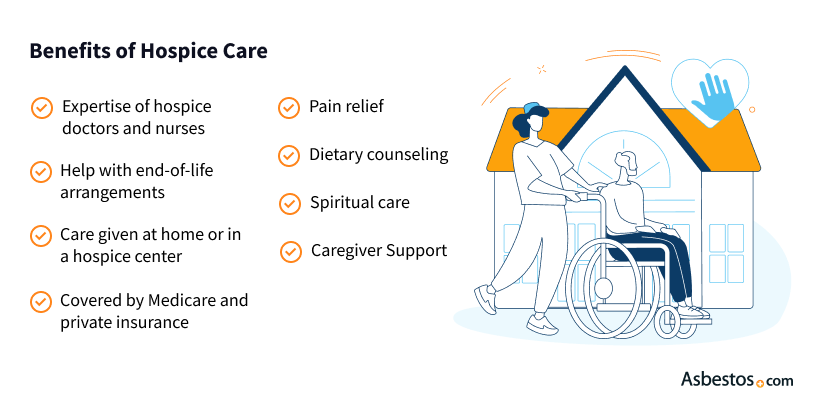Get Your Free Mesothelioma Guide

Find a Top Mesothelioma Doctor

Access Help Paying for Treatment

Mesothelioma hospice care focuses on making patients more comfortable with palliative or supportive care and addressing their emotional and spiritual needs. Patients are eligible for hospice when they no longer respond to medical treatment.
Written by Amy Pelegrin | Edited By Walter Pacheco | Last Update: March 5, 2024
Patients and their families may consider hospice care once doctors assess the patient likely has six months to live. Hospice is a type of health care that aims to relieve symptoms and improve quality of life for people with terminal conditions.
Hospice offers levels of service that range from basic care provided at home to complete care provided at inpatient medical facilities. While these services are not intended to improve a mesothelioma prognosis, some patients outlive their initial prognosis thanks to the high-quality care that hospice provides.

The typical life expectancy for mesothelioma is about one year. Many families facing mesothelioma come to rely on hospice care to access excellent health care and supportive services.As a patient, choosing this type of care doesn’t mean you’re giving up.
As a caregiver, it doesn’t mean you’re abandoning a loved one. Hospice is about providing comfort and preserving quality of life.
Get Your Free Mesothelioma Guide

Find a Top Mesothelioma Doctor

Access Help Paying for Treatment

Hospice care for mesothelioma patients may include assistance to improve breathing, pain control and diet plans. Hospice professionals also offer services that extend beyond the physical, incorporating emotional, social and spiritual support when requested.
Hospice professionals can also help with end-of-life arrangements, such as wills and advance directives. Nondenominational spiritual counsel and support groups for patients who wish to participate are also offered. After a patient dies, these programs continue to offer support groups, counseling and bereavement services to the family for an extended period of time.
Hospice workers may administer additional medications to help reduce late-stage mesothelioma pain. Because of its ability to reduce breathing stress for patients with lung diseases like mesothelioma, morphine is commonly prescribed to pleural mesothelioma patients. Hospice can also offer alternative painkillers to reduce related discomfort.
Mesothelioma cancer can weaken several major bodily systems. Pleural mesothelioma patients can benefit from breathing techniques and specific positioning techniques that can help a patient position themselves to optimize airflow. A compromised digestive system is a primary concern for peritoneal mesothelioma patients. Hospice teams can create customized nutrition plans to ensure patients are nourished and hydrated.
The 4 levels of hospice care are tailored to meet the unique needs of mesothelioma patients and their families. Each level provides increasing levels of comfort and support.
Every level of hospice care aims to deliver holistic and compassionate care. Mesothelioma patients may experience some or all these levels at different stages of their hospice journey. Hospice provides a team of healthcare professionals, including nurses, aides and social workers, at each level of care.
Speaking with your doctor about the kind of care you may need can help you make decisions about the level of hospice care that would work best for you and your family. Depending on your location, you may have multiple choices for where to receive hospice care.
You can ask your doctor for a referral and a hospice representative is often on staff at hospitals and cancer centers to answer questions. Hospitals and treatment centers also have local hospice contacts for patients and family members to reach out to about end-of-life care.

With more than 4,700 hospice programs in the U.S., many of which Medicare has certified, choosing a facility can feel overwhelming. Speaking with a Patient Advocate or using sites such as Hospice Compare can help.
Be sure to ask about the facility’s experience specifically with the complex aspects of caring for someone with mesothelioma.
Once you’ve officially decided to proceed with hospice care, your oncologist can approve the paperwork confirming your eligibility for this type of care.
Hospice can relieve some caregiving stress while ensuring patients receive optimal end-of-life care. In addition to routine or continuous at home or inpatient care that offers specialized mesothelioma care, respite care also benefits caregivers, giving them a true break from the challenges of caregiving.
In addition to physical care, hospice workers can help with other end-of-life services. These services help caregivers ensure their loved one’s wishes are respected and plans are in place for the future. Bereavement services also support caregivers through the grieving process.
It may be difficult for some caregivers to suggest hospice to their loved one with mesothelioma. Some doctors will suggest hospice to the patients themselves when their clinical symptoms and progress indicate that it would be the most beneficial mode of care.
Medicare Part A covers the vast majority of people who enter hospice care. The Medicare Hospice Benefit covers care related to the terminal illness but doesn’t cover all aspects of care.
For example, patients can expect copays for prescriptions and can expect to pay a portion of fees related to respite care. Any type of complementary care a patient elects on their own that the hospice care team doesn’t recommend won’t be eligible for Medicare coverage.
Statistics about hospice care show that Medicare paid $23.1 billion for hospice care services in 2021. Mesothelioma patients are eligible for financial aid, such as medical grants and Social Security Disability, to help cover the costs of health care not covered by hospice.
These resources can help your family access hospice care in your community. Learning more about how hospice works and your options can help ease families’ concerns.
This foundation offers information about hospice and its services, grief resources and educational resources. It also offers a message board to discuss hospice topics.
This organization provides information about hospice care. It can help families locate and choose a provider.
This association advocates, promotes and protects high-quality health care for the terminally ill. It educates hospice workers and lobbies for the rights of the terminally ill.
This is a public service the U.S. Administration on Aging provides. It helps families find services for older adults, including hospice care.
Many mesothelioma survivors have benefitted from hospice care and recommend it to other families facing the same diagnosis. Some of them entered hospice care and left it soon after because their cancer stopped progressing.
Virginia Beach was diagnosed with pleural mesothelioma in 2005 and underwent eight rounds of chemotherapy that put her cancer into remission for nearly 10 years. In 2014, she developed shortness of breath and her oncologist recommended hospice care.
A hospice nurse and social worker began visiting her regularly. Her primary care physician and the hospice chaplain also came by, but her health began to improve suddenly and she was able to leave hospice care.
“After a while, the doctor told me my lungs were clear. I didn’t need them to do much, but the nurse did help me understand my iPad, and how to use it better,” Beach said. “That was a big help to me.”
Rich DeLisle was diagnosed with pleural mesothelioma in 2012 and underwent aggressive surgery and other mesothelioma treatments, which put his cancer in remission for several years. When the cancer returned in 2017, DeLisle tried several treatments before deciding he wanted hospice care.
“My body is gone. I was tired of being sick,” DeLisle said. “I couldn’t take any more of those treatments. We’ve cried together enough. It was just time for something else.”
DeLisle and his wife informed their family and friends of the decision. They invited everyone to visit and spend quality time together.
“We didn’t invite anyone here to sit around and mope over me,” Rich said. “I have to get ready for the party tonight.”
Randy Sloan was diagnosed with late-stage pleural mesothelioma in 2016. He underwent chemotherapy and radiation therapy, but the side effects were difficult to live with. Within six weeks of his diagnosis, his condition was rapidly declining.
Sloan decided against further treatment and chose to enter a hospice care facility called the Zen Hospice Project in San Francisco. Sloan chose Zen because he had a personal relationship with the former director.
“I knew he needed much more care than we could provide him and much more care than he wanted a family member to give him,” said his mother, Melany Baldwin. “Going to a place like he did, he felt unburdened, and it was unburdening for everyone.”
Another reason Sloan chose Zen was they take a unique approach to carrying out the dying wishes of the people under their care. The day before he died, Zen organized a sailing trip across San Francisco Bay for Sloan, his friends and family.
“He was himself until the end,” Baldwin said. “And that was how he wanted it. He had the best possible medical care, and the best possible dying care. At the end, he opted for a shorter, better life.”
This Page Contains 6 Cited Articles
The sources on all content featured in The Mesothelioma Center at Asbestos.com include medical and scientific studies, peer-reviewed studies and other research documents from reputable organizations.
Your web browser is no longer supported by Microsoft. Update your browser for more security, speed and compatibility.
If you are looking for mesothelioma support, please contact our Patient Advocates at (855) 404-4592
The Mesothelioma Center at Asbestos.com has provided patients and their loved ones the most updated and reliable information on mesothelioma and asbestos exposure since 2006.
Our team of Patient Advocates includes a medical doctor, a registered nurse, health services administrators, veterans, VA-accredited Claims Agents, an oncology patient navigator and hospice care expert. Their combined expertise means we help any mesothelioma patient or loved one through every step of their cancer journey.
More than 30 contributors, including mesothelioma doctors, survivors, health care professionals and other experts, have peer-reviewed our website and written unique research-driven articles to ensure you get the highest-quality medical and health information.
My family has only the highest compliment for the assistance and support that we received from The Mesothelioma Center. This is a staff of compassionate and knowledgeable individuals who respect what your family is experiencing and who go the extra mile to make an unfortunate diagnosis less stressful. Information and assistance were provided by The Mesothelioma Center at no cost to our family.LashawnMesothelioma patient’s daughter


Pelegrin, A. (2024, March 5). Hospice Care for Mesothelioma Patients. Asbestos.com. Retrieved December 19, 2024, from https://www.asbestos.com/support/hospice/
Pelegrin, Amy. "Hospice Care for Mesothelioma Patients." Asbestos.com, 5 Mar 2024, https://www.asbestos.com/support/hospice/.
Pelegrin, Amy. "Hospice Care for Mesothelioma Patients." Asbestos.com. Last modified March 5, 2024. https://www.asbestos.com/support/hospice/.
Mesothelioma Center - Vital Services for Cancer Patients & Families doesn’t believe in selling customer information. However, as required by the new California Consumer Privacy Act (CCPA), you may record your preference to view or remove your personal information by completing the form below.
